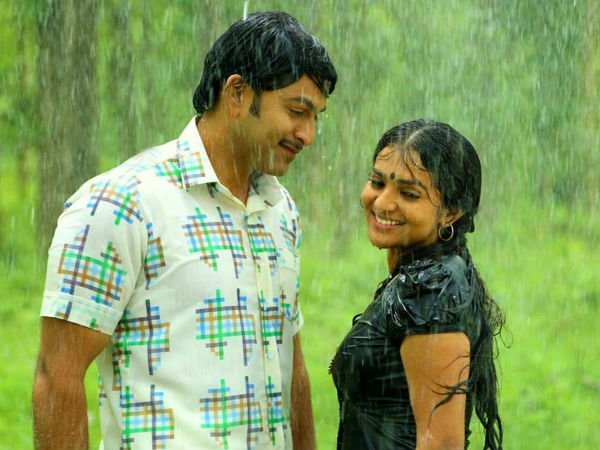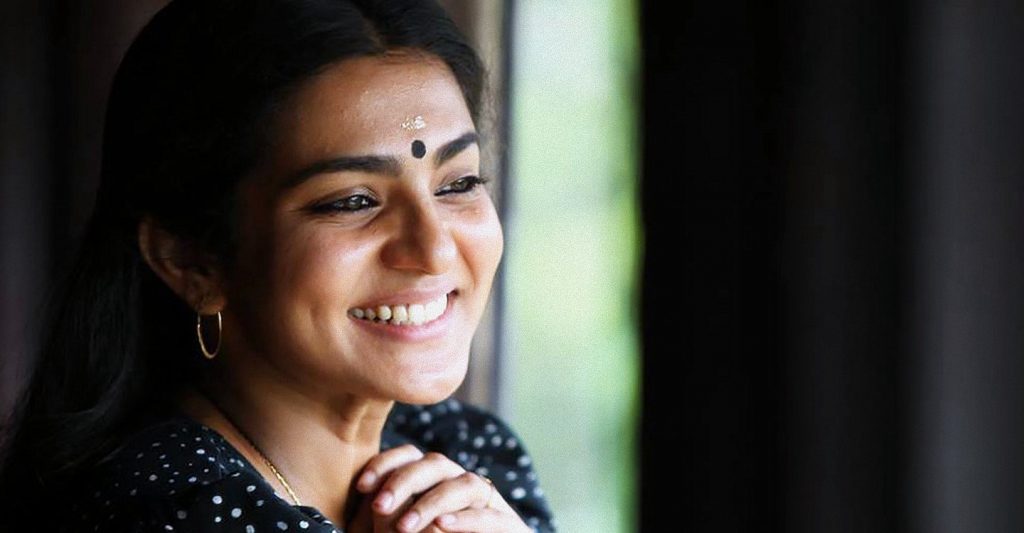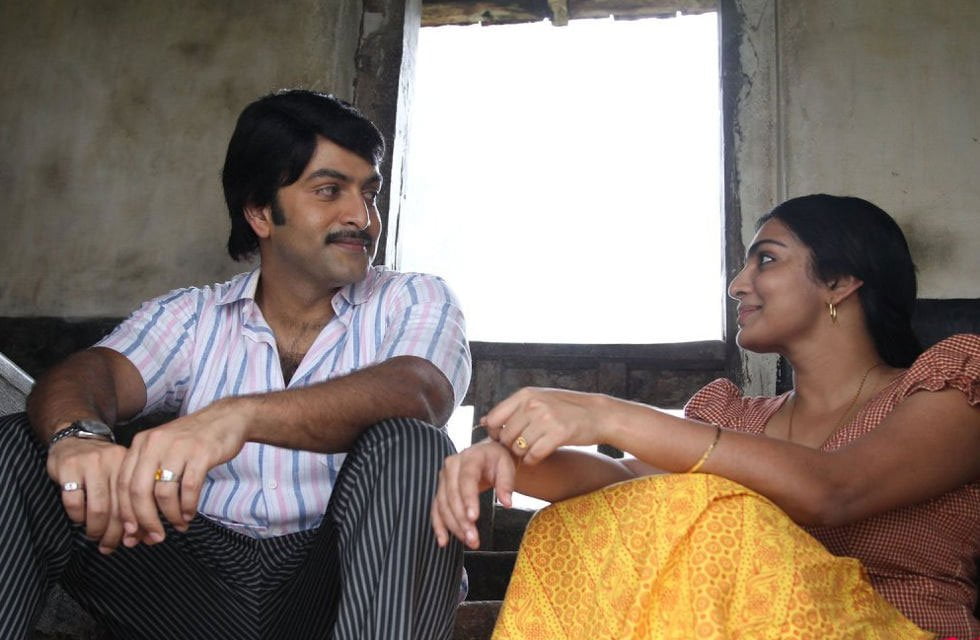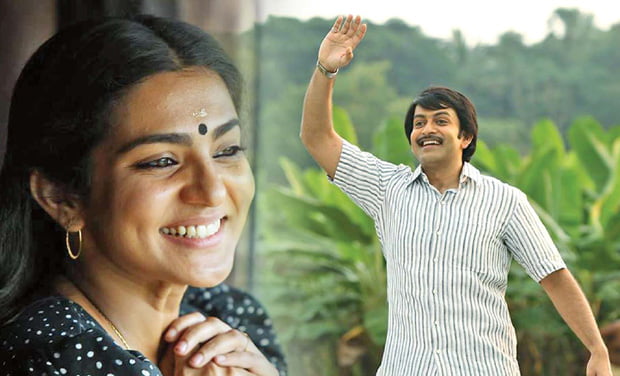As long as love is just for the cinema of tolerant times and a fancy ritual amongst the privileged, “love jihad” is just love and romance of sacrifice. Paradoxically, for an ordinary citizen, for whom movies are made and because of whom celebrities exist, love becomes another surveillance. With vigilante squads and moral policing upholding valuable morals, doesn’t it feel like the state is taking over the sexist gossip that was originally just for neighbourhood parties and teatime shaming?
Ennu Ninte Moideen is a Malayalam movie directed by RS Vimal starring Parvathy Thiruvothu and Prithviraj as its primary characters.
It is a real life Shakespearean tragedy wrapped in patriarchy with crumbs of feminist dialogues for claps. Ennu Ninte Moideen which roughly translates to “Yours Truly Moideen” is the love story of Kanchanamala and Moideen. These two characters fall in love with each other and want to marry but are unable to do so because of the intervention of religion and family. ‘Love Jihad’ is a stronger version of the same orthodoxy backed by criminalisation of love, destruction of liberty and a complete demolition of personal choices.
“Love Jihad” and “Ennu nine Moideen”, what do they have in common?
Both are dealing with the romantic sacrifices of the platonic love, which goes beyond the worldly edifices of power, whether patriarchal or religious. Behind these attractive facades lies detrimental reinforcement of gender norms. Love jihad looks at women through a patriarchal lens, women are for the control and consumption of patriarchs and men, the embodiment of toxic masculinity.
This phenomenon of intolerance can be explained by a love story from the 1950s. In Ennu Ninte Moideen, families oppose the marriage on religious grounds which results in Kanchanamala’s education being stopped and she is locked in a room sine die, due to which their love story turns into a 10-year-long wait without seeing each other and only communicating through letters.

The movie begins with the portrayal of a young and rebellious girl named Kanchanamala fighting for the same kind of food to be served in a catholic institution instead of different kinds food for girls from different strata of society. She is a strong woman standing up for equality in an orthodox setup. But as the movie advances amidst the evergreen hero worship, Kanchamala becomes ornamental from fundamental. She becomes less of an individual and more a part of this man named Moideen. Sexism veiled in romanticism is nothing new to cinema or Indian identity politics. But being a movie celebrated in the name of feminism, while feminism is purely ornamental is troublesome.
Ennu ninte Moideen is a highly celebrated movie in Kerala and for the wrong reasons much like Love jihad on Twitter. Kanchanamala is a strong woman who stood up against patriarchy and fought against the world for her love. And as a fellow woman, I respect and applaud that. But unfortunately this isn’t the reason why the movie was celebrated.
We have always seen women being associated with family and the role of women in the family highly sacrificial in nature. A woman who is married is to devote her life to the betterment of the family, thereby giving into patriarchal mania of submissiveness. This can be seen in the flamboyant idea of Love Jihad as well. A woman would never dare to fall in love with a muslim man, right? She has no agency and mind of her own, obviously!
Kanchamala is to cook, to clean, to keep things in order and to make life a little easier for everyone else. And if she is a working woman, the work is a bonus to everything else that still entails her just because she is a woman. We as a community and society have always idealized and romanticized the idea of sacrifice and domestication of women. Even when talking about mothers, we often come across articles that talk about how much mothers give up and do just for their kids just to reach this stage of being called “a good mother”. The level of sacrifice defines a woman’s worth and goodness.

Ennu ninte moideen which roughly translates to “Yours Truly Moideen” is the love story of Kanchanamala and Moideen. These two characters fall in love with each other and want to marry but are unable to do so because of the intervention of religion and family.
A mother becomes the only thing that a woman is. She could be a doctor, a painter, a musician but the veil of a sacrificial mother will surpass all. Total dedication and offering by a woman in the name of love is the spiritual pound of flesh. A domesticated woman is a good woman and an untamed woman a threat. What is next on line in the perpetual give up list, eh?
Let’s dare to imagine, Kanchanamala being married to Moideen! What next? She would be a homemaker and live her life in Moideen’s household and nobody would have cared. But that did not happen, so we as a society gave into gender repressive romanticism—the idea of a sacrificial woman all over again, how innovative!
She gave up her education, her youth, her love for 10 years all for the well-being of her family. On one hand, as Kanchanamala rotted away in a room, Moideen’s trajectory doesn’t seem all that gruesome. He was a free man and lived an adventurous life despite being banished from his house because he loved Kachana. 21st century India hasn’t changed much after all eh? Victim blaming, no social freedom for women, no education and no agency.
A minute of silence for the progress please.
Moideen was politically active, participating in strikes and rallies and even organising theatre performances paraphrasing his own love story. He lived as a free man with a fulfilling life, only bound by the shackles of love. Yet the tallest figure of this movie is Moideen. This is a story of a woman told through patriarchal gazes. Moideen’s death in the later part of the movie was also an act for the well being of others and it is outside the structural obstacles. Whereas, Kanchanamala lived within the feudal darkness with one sole goal to look forward to, i.e to be with the love of her life.

Kanchanamala from being a brilliant medicine student is reduced to being Moideen’s lover. And Moideen’s lover alone. And this idea is further emphasised by a dialogue which was widely celebrated in Kerala as the epitome of love. “Iravazhinja Puzha Arabi kadaline ulathanegil, Kachanamala Moindeen ulltha,” which translates to “If Iravazhinja river is for the Arabian sea, Kanchamala is for Moideen.”
Also read: Why Delhi Crime Winning The International Emmy Is A Bitter-Sweet Moment
This statement is not the epitome or the last word of romanticism or love but a reestablishment of the idea of ownership over women. First, the woman is perceived to belong to a father and then to a husband. Man becomes the protector and dominating figure again. Ultimately, her story of sacrifices shows the fate and finale of women who go against the male dominant moral structure. If you think about it, Love Jihad isn’t much different from the ethos of this movie—freedom to love vs. reinforcement of extreme patriarchal ideologies by identity politics.
In Ennu Ninte Moideen, families oppose the marriage on religious grounds which results in Kanchanamala’s education being stopped and she is locked in a room sine die, due to which their love story turns into a 10-year-long wait without seeing each other and only communicating through letters.
Coming back to the crumbs of feminism and feminist dialogues in the movie, making an actress (Parvathy Thiruvothu) who identifies with the feminist movement say feminist dialogues is only tokenistic feminism. Further, Moideen is often portrayed as a secular and liberal person who just, you know, happens to want to own another human being, much like the state wanting to control personal choices. The movie towards the end sees the rise of another female character, Moideen’s mom.
Conclusion
In the beginning of the Ennu Ninte Moideen, Kanchanamala is a woman who is suppressed by a patriarchal father figure. Towards the end, she resists him, and stands up against him. In the end of the movie, you see Kanchanamala being brought to Moideen’s house by Moideen’s mother as Moideen’s unmarried widow. Despite women being an omnipresent and driving force in this movie, it is still Moideen’s story not Kanchanamala’s, the name of the movie clearly speaks volumes.
Also read: Mirzapur Season 2: Transcending Conventional Feminine & Masculine Structures
Towards the end of the movie, Kanchanamala just seems like another one of Moideen’s adventures much like the shenanigans of partisan’s politics in the name of progress. Another victory for patriarchal megalomania? It’s quintessential to remember what English writer David Mitchell once said, “It’s always the poor people who pay. And always it’s the poor people’s women who pay the most.” The rich and privileged aren’t under surveillance here, it is the already oppressed being reminded of their unequal standing in a country that promises equality. Cinema, in spite of having the power to change narratives, continues under the patriarchal slavery of narratives and portrayal.
Featured Image Source: Hotstar
About the author(s)
Shivani Menon is an ardent reader and cinephile, who spends most of her time amidst books and the remaining time binging on classic movies. She describes herself with a quote by Sartre, "I exist, that is all and I find it nauseating."




